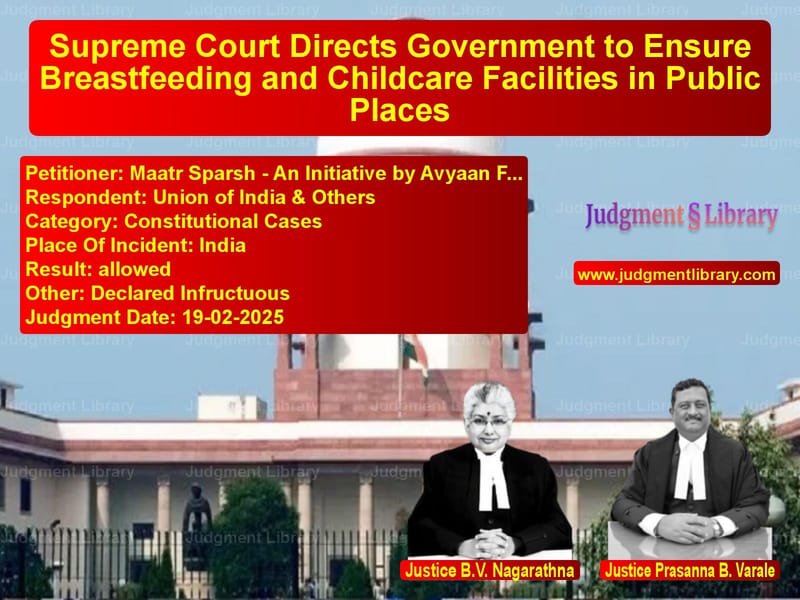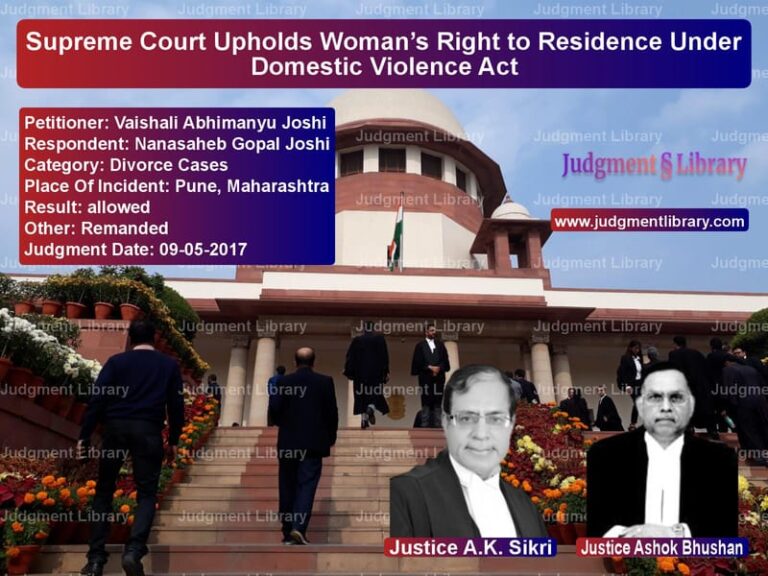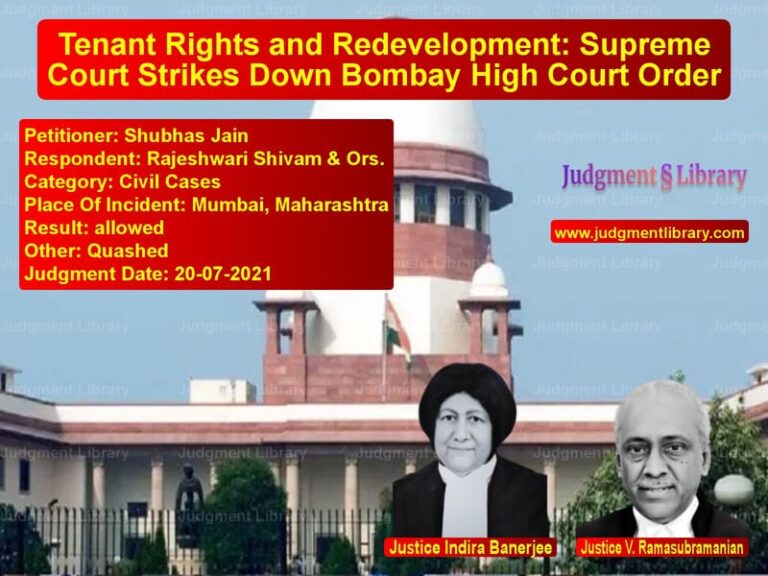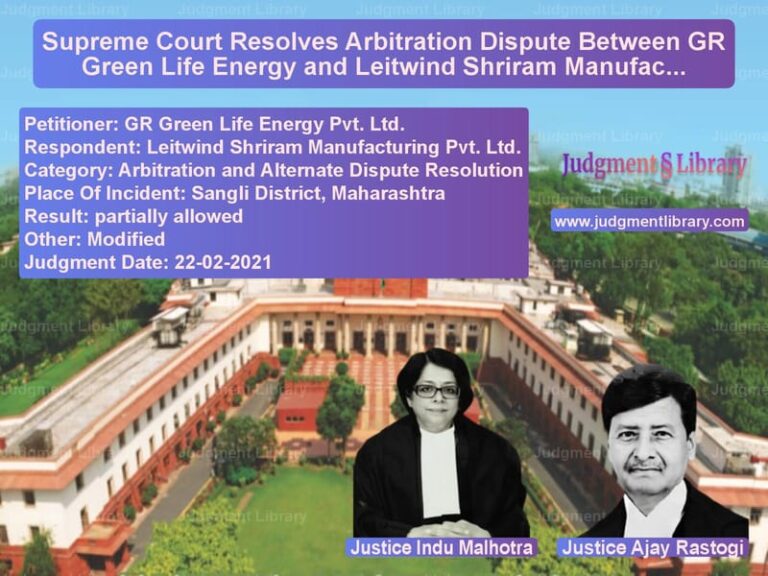Supreme Court Directs Government to Ensure Breastfeeding and Childcare Facilities in Public Places
The Supreme Court of India recently ruled in the case of Maatr Sparsh – An Initiative by Avyaan Foundation vs. Union of India & Others, addressing the fundamental rights of nursing mothers and infants. The judgment mandates the government to ensure breastfeeding and childcare facilities in public places across the country, reinforcing the importance of maternal and child healthcare.
The case arose from a Public Interest Litigation (PIL) filed by the NGO Maatr Sparsh – An Initiative by Avyaan Foundation, seeking a directive for the construction of feeding rooms, child care rooms, and crèches in public places to facilitate nursing mothers. The petition highlighted the difficulties faced by mothers who are unable to find private and hygienic spaces for breastfeeding in public areas.
Background of the Case
The petitioner, a non-governmental organization, approached the Supreme Court with the following key demands:
- A direction to all state governments and union territories to construct breastfeeding rooms and child care rooms at public places.
- Recognition of breastfeeding as a fundamental right for both the child and the mother.
- Issuance of guidelines ensuring that breastfeeding facilities are included in the design of public buildings.
The plea was filed after Advocate Neha Rastogi, a director of the NGO, personally experienced the difficulties of breastfeeding in public and realized the need for dedicated spaces. The petition cited various domestic and international laws to emphasize the importance of providing adequate facilities to nursing mothers.
Legal Issues Considered
The Supreme Court examined several crucial legal aspects:
- Whether the lack of breastfeeding and childcare facilities in public places violates the fundamental rights of women and children.
- Whether state governments are obligated under the Constitution to provide such facilities.
- The role of Article 21 (Right to Life) in ensuring dignity and privacy for nursing mothers.
- The state’s duty under Article 39(f) and Article 47 of the Constitution to promote child welfare and public health.
- India’s international commitments under the United Nations Convention on the Rights of the Child (UNCRC) and Universal Declaration of Human Rights (UDHR).
Arguments of the Petitioner (Maatr Sparsh – An Initiative by Avyaan Foundation)
The petitioner contended:
- The absence of breastfeeding and childcare rooms in public places forces mothers to either breastfeed in unhygienic and uncomfortable conditions or refrain from stepping out altogether.
- Breastfeeding is a fundamental right linked to the Right to Life under Article 21 of the Constitution, ensuring the well-being of both mother and child.
- India is a signatory to various international treaties, such as the UNCRC, which recognize the right of children to proper nutrition and healthcare.
- Existing government schemes and policies, including the National Food Security Act, 2013, acknowledge the importance of early childcare and maternal support but lack implementation in public spaces.
- The Delhi High Court had earlier directed the government to maintain feeding rooms, but further nationwide steps were needed.
Arguments of the Respondent (Union of India)
The Union of India responded:
- The government had already issued advisories encouraging states and union territories to provide feeding rooms and childcare facilities.
- Recent initiatives, including a communication from the Ministry of Women and Child Development dated February 27, 2024, had been sent to all state governments for implementation.
- The issue fell under the jurisdiction of state governments, and directives had been issued to facilitate compliance.
Supreme Court’s Observations
The Supreme Court emphasized the importance of ensuring privacy, dignity, and hygiene for nursing mothers and ruled in favor of the petitioner.
On the Fundamental Right to Breastfeeding
“Breastfeeding is an integral component of a child’s right to life, survival, and development to the highest attainable standard of health. The State has the obligation to ensure adequate facilities and an environment conducive to breastfeeding.”
On the Role of the Government
“The State shall direct its policy towards ensuring that children are given opportunities and facilities to develop in a healthy manner, as enshrined under Article 39(f) of the Constitution.”
On International Obligations
“India’s commitment under the UN Convention on the Rights of the Child mandates that necessary measures be taken to facilitate breastfeeding in public spaces. The creation of gender-friendly spaces is a fundamental necessity.”
Final Judgment
The Supreme Court issued the following directives:
- The Union of India shall issue an official notification reinforcing the advisory dated February 27, 2024, directing all states and union territories to construct feeding rooms and childcare facilities in public spaces.
- All states and union territories must ensure compliance within six months, with periodic progress reports submitted to the Supreme Court.
- Public buildings under construction must allocate designated spaces for breastfeeding and childcare.
- All government offices, public sector units, railway stations, bus terminals, airports, shopping malls, and hospitals must have dedicated rooms for nursing mothers.
- Regular audits will be conducted to monitor implementation, with reports filed with the Ministry of Women and Child Development.
Conclusion
This landmark ruling reinforces the fundamental right of mothers to breastfeed in a dignified and safe environment. By directing state governments to ensure designated feeding rooms and childcare spaces, the Supreme Court has taken a progressive step toward gender-sensitive infrastructure.
The judgment sets a precedent for ensuring gender-friendly spaces in public infrastructure, aligning with India’s constitutional and international obligations. With proper implementation, this ruling will significantly enhance the accessibility and comfort of public spaces for mothers and infants across the country.
Petitioner Name: Maatr Sparsh – An Initiative by Avyaan Foundation.Respondent Name: Union of India & Others.Judgment By: Justice B.V. Nagarathna, Justice Prasanna B. Varale.Place Of Incident: India.Judgment Date: 19-02-2025.
Don’t miss out on the full details! Download the complete judgment in PDF format below and gain valuable insights instantly!
Download Judgment: maatr-sparsh-an-in-vs-union-of-india-&-oth-supreme-court-of-india-judgment-dated-19-02-2025.pdf
Directly Download Judgment: Directly download this Judgment
See all petitions in Fundamental Rights
See all petitions in Public Interest Litigation
See all petitions in Separation of Powers
See all petitions in Education Related Cases
See all petitions in Judgment by B.V. Nagarathna
See all petitions in Judgment by Prasanna Bhalachandra Varale
See all petitions in allowed
See all petitions in Declared Infructuous
See all petitions in supreme court of India judgments February 2025
See all petitions in 2025 judgments
See all posts in Constitutional Cases Category
See all allowed petitions in Constitutional Cases Category
See all Dismissed petitions in Constitutional Cases Category
See all partially allowed petitions in Constitutional Cases Category







